Review: Commentarii De Gallico Bello
:date: 2023-10-30 11:51 :tags:
I want you to try to think of a famous historical figure who exploited internal political discord to dismantle democratic institutions and seize dictatorial control over a significant European nation.
His charisma commanded fanatical cult-like reverence, particularly among his military ranks. A master of propaganda, he held grand rallies and events designed to instill a sense of nationalistic fervor in his populace. His political machinations in the capital were so contentious that they even led to assassination plots against him.
Commanding a technically advanced military force that included not just infantry but also German cavalry, he benefited from their exceptional training, equipment, and discipline. He aimed to enlarge his Reich through military aggression, successfully occupying France and establishing naval bases there. Although he faced resistance from French guerrilla fighters, his ambition did not wane. He intended to invade and subjugate Britain; however, his efforts ultimately met with failure despite some initial destruction on the island.
This leader is infamous for his extensive use of slave labor and orchestrating a European genocide, personally ordering the calculated extermination of entire populations - civilians, women, and children included. If you thought that was the most notable thing about this historical person, you'd be wrong in this case. The individual I'm describing is not Hitler. Nor is he reviled for being so like him. The man I'm describing is, in fact, celebrated. The entire month of July.
The month of July — formerly known as Quintilis — is relevant to this story because it was proposed in 46BC by the very same psychopath I'm describing. This calendar reform was mostly sensible but it afforded an irresistible opportunity for one of the most successful propaganda feats of all time. We know this calendar today as the Julian Calendar, which at the time was likely known as the "Calendarium Caesaris".
The author of "Commentarii De Gallico Bello" ("Commentaries On The Gallic War") was Julius Caesar.
I possess an 1884 edition of Caesar's Commentaries which my grandfather had purchased from the Point Loma Library in 1979.

It actually says "Copyright. Charles DeSilver & Sons. 1884." — which seems a bit of a reach for a book that is over two millennia old.

I had largely forgotten about it and was reminded of it while organizing my books this year. Since I've been studying Latin it seemed a serendipitous encounter. The chance to read a 2073 year old book in its original language seemed like something to not pass up.
This particular book was printed (says the preface) "with an analytical and interlinear translation". This means that every line of Latin is followed by a line of English. The English isn't sensible English but more like the kind of thing you'd find if you looked all the Latin up in a dictionary. This format is extremely helpful in learning the Latin and its idiosyncrasies.
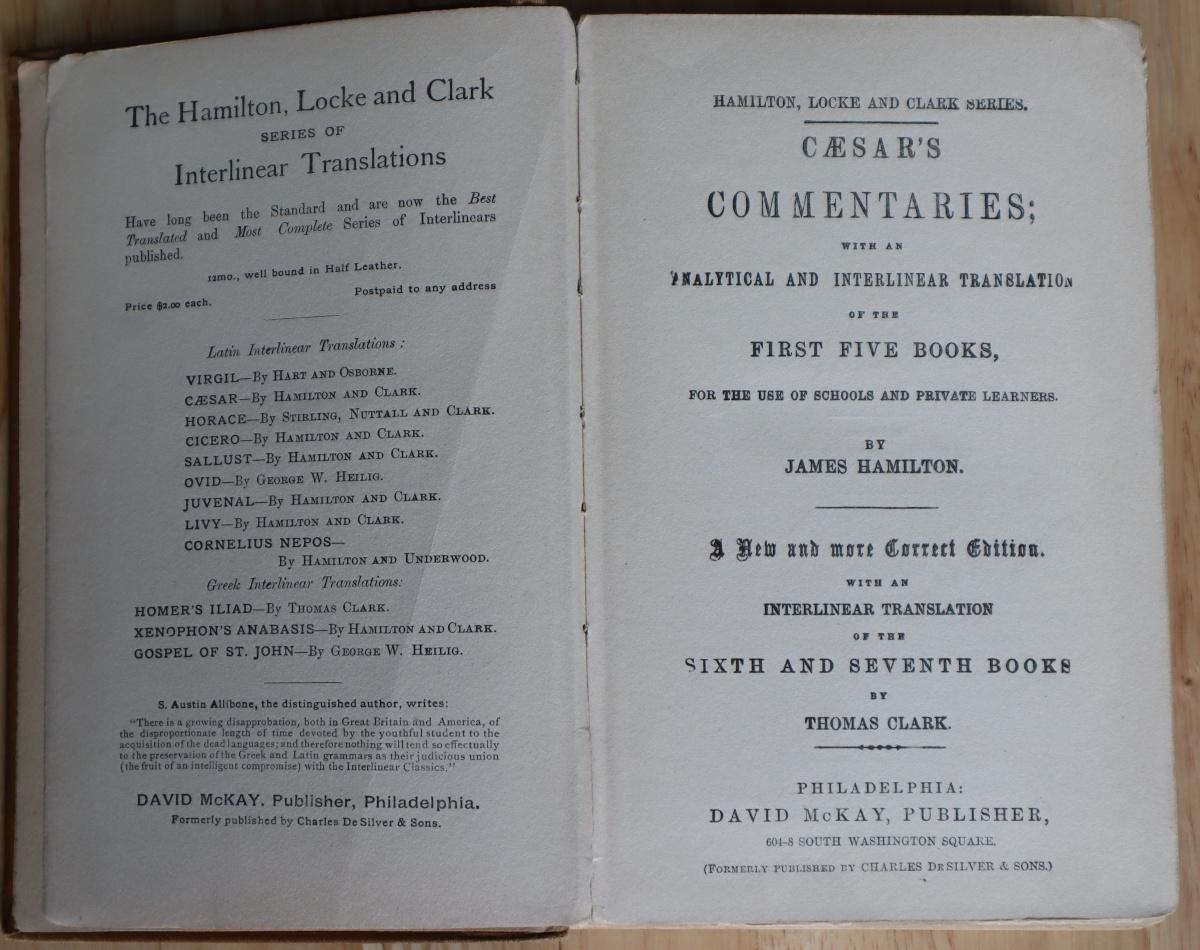
At first the book was very hard to read and the Latin was quite foreign to me. But by the end I felt I was getting used to it and that I could pretty much read what was written. Making sense of the text was a different matter. But as a tool for getting acclimated to Latin's quirks, it works well. Thumbs up for language pedagogy.
The seven "books" in this volume are basically written like a director's commentary on a DVD, with Caesar saying basically whatever he wants about the action that happened in the form of an abstract review. The main gist of the whole thing for those not familiar with this period of history is that Caesar is running around northwestern Europe with a pretty big army conquering the Gauls. Today the Gauls are mostly known as French people, but Caesar really is after any place that had Celtic or La Tene heritage. This includes everything between what is modern Germany, Spain, and Scotland.
The exact borders and geography in general are pretty fuzzy. Where Germany, Italy, and France converge is a good example. Because of my domain name (xed.ch), I take a special interest in the Helvetii. The Swiss top level domain of ".ch" is an initialism for "Confœderatio Helvetica" and refers to the people Caesar tangled with who lived in that area. It turns out it is all quite muddled and not much is known except for Caesar's commentary. According to him, the Helvetii were ingrates not content to live among the beautiful Alpine landscape; when the Romans showed up, they were busy trying to move house by invading some people next door in Gaul. All this could be completely factually true or completely made up. But what little we know or think we know about these people, including, it would seem, any knowledge of any specific persons, comes directly from Julius Caesar in the form of this book.
The prose goes on and on with battles and marches and negotiations and basically anything Caesar can think of to illustrate Caesar being extraordinarily competent and clever. The text is cursed not only with the exact classic dry retelling of "notable" events so dreaded by people who "hate history", but this is exacerbated by the fact that the context is so distant and unknown. To give you an example, I opened the book at random and looked for the nearest proper noun — "legatos in Ubios". Ok, great. Caesar is sending envoys to the Ubii tribe. Who are these people? I have no idea. Looking into the Ubii on Wikipedia tells us very little about them. About the only thing we know is that they lived near modern day Cologne, Germany and that they were brought to our attention — placed on the map as it were — by Julius Caesar! If you've ever driven across the USA and been befuddled by what the difference between a Potawatomi and a Kickapoo was, well, Caesar's commentaries can give you that same sense of having no clue what's going on with the locals — but with Europeans!
Buried in all that were some facts that even if not so entirely factual were quite fascinating. I, like Caesar himself, was impressed with his army's engineering prowess. The best example is when he describes a little side trip he took to Germany to frighten the locals. These locals thought they were somewhat protected because they were separated from Caesar's army by the natural barrier of the Rhine River. Caesar is not impressed. (From IV:17)
"Caesar ... Rhenum transire decrevat; sed navibus transire neque satis
tutum esse arbitrabatur neque suae neque populi Romani dignitatis esse
statuebat."
"Caesar... had resolved to cross the Rhine; but to cross by ships he
neither deemed to be sufficiently safe, nor considered consistent with
his own dignity or that of the Roman people."Caesar decides that a proper Roman flex would be to walk over the Rhine on a bridge. So he has one built, suitable for his army to cross. In ten days. (From IV:18)
"Diebus X, quibus materia coepta erat comportari, omni opere effecto
exercitus traducitur."
"Ten days after wood gathering was started, the work was
completed, and the army led over."The rest of 17 is spent nerding out on specific engineering details of this brilliant piece of military engineering.
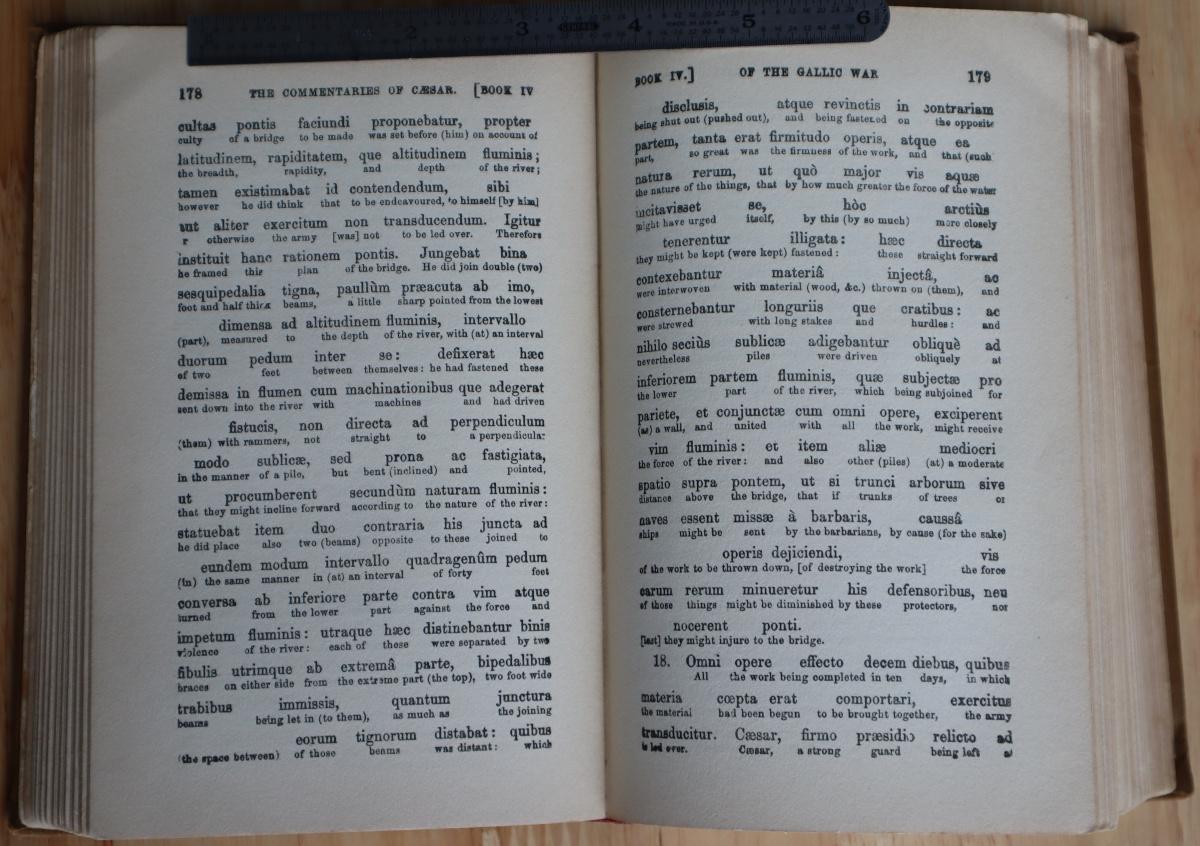
He's clearly aware that the Romans have an edge when it comes to engineering. He only tarries in Germany a few weeks but after burning enough villages and stealing enough grain to make his point, he returns back over his bridge and then promptly destroys it. The message to the Germans is clear: you can't cross this river as freely as I can, so behave yourselves.
Other engineering details are given about fortifications, ditches, walls, towers, tormenta (seige engines, missile launchers), and complex insidae (traps). He also works with naval architects to get some ships built that can cleverly overcome the Romans' traditional clumsiness at sea (though his fleet does seem to get smashed up on pretty much every outing anyway).
The real genius of any of these successful military commanders lies in their mastery of industrial engineering. Here's an interesting video that tries to visualize what was necessary for the Roman army simply to relocate every day. I'm amazed at the fact that everywhere they went, after a 30km march, they cleared the land, erected stockade walls out of tree trunks, and dug a ditch/moat around the whole thing. It would take hours for them all just to file out of the previous encampment. This single day engineering effort was often sufficient for the residual campsite to be turned into a subsequent town by the locals; any English location with the name ending in "-chester" or "-caster" is named for the Roman word for military camp, "castra".
One very interesting topic is Caesar's description of the druidic culture he found while traveling in Gaul. The druids are pretty mysterious and for that we can not blame Caesar. The oldest detailed description of druids comes — you guessed it — from Caesar's commentaries. Most of what we think we know about these people come from brief mentions in this book. Notably: they were respected for worship, sacrifices, divination, and judicial functions. It was a very high status job. They had a very difficult training agenda involving a lot of memorization and possibly dozens of years of instruction. According to Caesar, it was especially prestigious for families that wanted a kid to be a druid to send him to Britain where presumably they were very serious about it.
The other interesting thing Caesar notes about the druids is that they "process" not just religious animal offerings but human sacrifices too. Caesar describes the druids as building large human effigies which they would fill with live humans and the whole thing would be set on fire. Think of it as Burning Man but with actual live men burning inside the Man. Of course all this could be sensational nonsense. It would appear the druids' bigger mistake (than human sacrifice) is one we can learn from today: they were fearful of "new" information technology. They deliberately avoided using literacy in favor of finding and developing talent for prodigious memorization. They knew about literacy and could even read and write using a Greek alphabet. But they considered that level of commitment insufficient to document their important practices, which they memorized. And today, the vast majority of their entire culture remains a complete mystery. In fact, much of what is known about them is suspect because it comes from a single contemporary source — Caesar's Commentarii.
As someone born on the island I found all of Caesar's mentions of Britain to be quite interesting. I definitely got the feeling it had the same kind of Celtic type people that existed in Gaul. Well, in the same way that Daniel Boone might have considered Delawares, Shawnee, and Cherokees to be roughly the same. Britain was on one hand a mysterious place beyond knowledge but yet at the same time, regularly visited by merchants and part of a pretty dynamic cultural sphere that included much of the continent.
Once Caesar, did finally make it to Britain, the notable cultural difference from his perspective (focused on killing soldiers) was the distinctly British habit of using war chariots. Chariots certainly weren't unknown to the rest of the ancient world but it seems that in Britain the practice of using them in military situations persisted pretty much until the Romans arrived. While this surprised the Romans and gave the chariots some efficacy, for the rest of the world the technology had already fallen out of favor with successful armies.
One topic that was quite interesting to a modern perspective is the use of "obsides". If you look that word up, you'll find it means "hostages" but the Latin word itself may offer clues - "ob sedit" may mean something like "he blocks by sitting out". If some foreign ruling nobles promised to not harass the Romans (generally after watching all of the neighboring tribe get exterminated, etc.), the Romans might ask for some number of "hostages" and this was totally normal. These people weren't exactly prisoners; they were more "guests" who couldn't leave and who would be crucified if their relatives double crossed the Romans. In just book one alone, this word (obsides) is mentioned about twenty times.
I found this fascinating and really wanted to know more about the lives of these people. Did the Romans ever kill any? For propaganda reasons, Caesar is careful to not reveal if he ever sent Roman "guests" to other lands but I sure was curious. One interesting dynamic of this kind of arrangement is that by taking these relatives of the ruling class and sending them to live with patriotic Romans, these barbarians would get to learn more about The Roman Way Of Life and be pulled closer into the Roman sphere of influence. As far as atrocities goes, this kind of foreign exchange program was probably one of the most useful for keeping peaceful relations.
One of the worst things about the book for me as a student of the Latin language is the peculiar grammatical style it is written in. Basically Caesar has an allergy to first person pronouns and, more importantly, verb conjugations. His commentary goes something like this.
"For these reasons he [I] appointed T. Labienus, his [my] legate, to the command of the fortification which he had made. He himself proceeds [I myself proceed] to Italy..."
I've marked what I thought sensible grammar changes should be made. I could actually have misinterpreted this — and this from the English translation of book 1:10, no Latin involved! Note how from that text we can't actually understand properly who made the fortification. Did Caesar "make" this fortification or did his lieutenant, Labienus, do it and Caesar is having him continue with that project? Basically we have memoirs where a guy does a lot of stuff and yet I got zero exposure to how normal people would talk about how they did stuff.
One explanation is that this was all dictated to scribes and they just couldn't get their head around it not being impudent to "impersonate" the person whose actions are being transcribed. Here is a good case for that theory at the very start of book II where the first person plural creeps in (twice) as if to possibly indicate a dictating general and a team of scribes.
"While Caesar was in winter quarters in Hither Gaul, as we have shown above, frequent reports were brought to him, and he was also informed by letters from Labienus, that all the Belgae, who we have said are a third part of Gaul, were..."
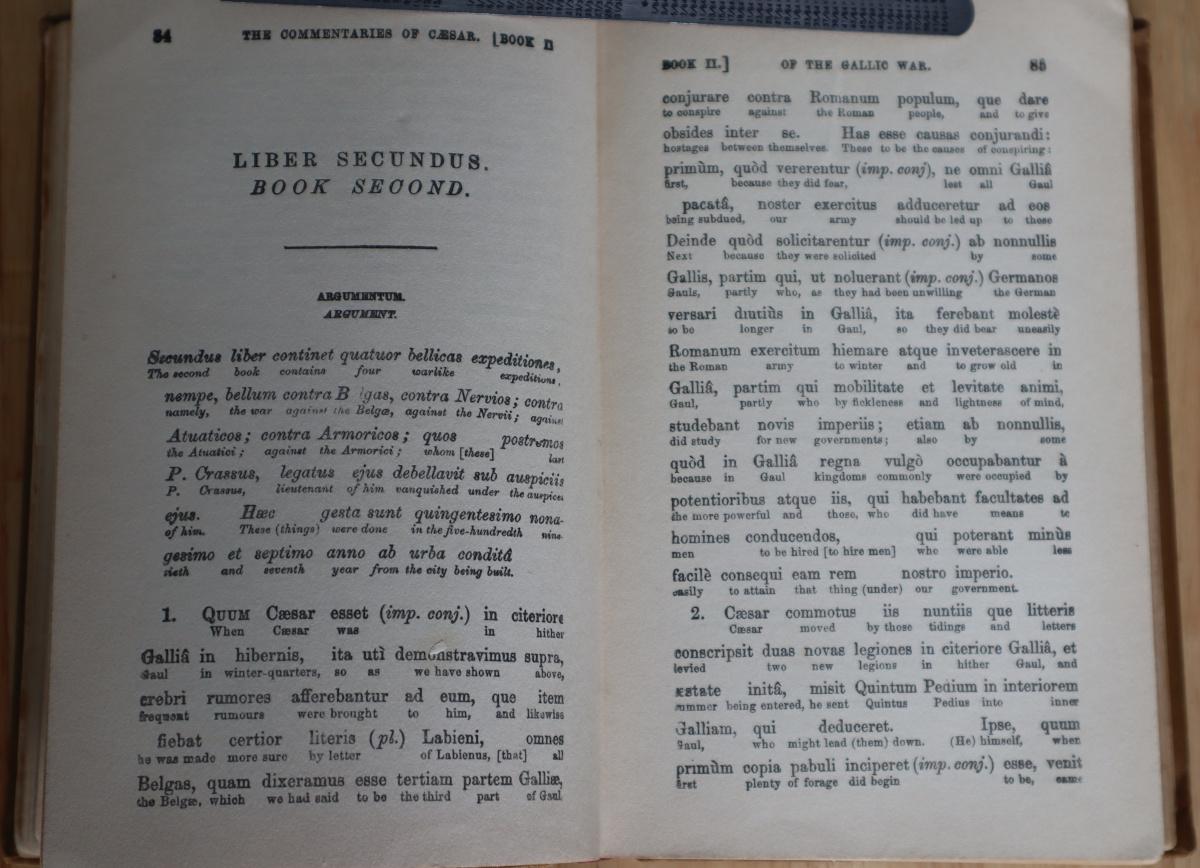
Here's a fun Astrix comic poking fun at this quirky style.
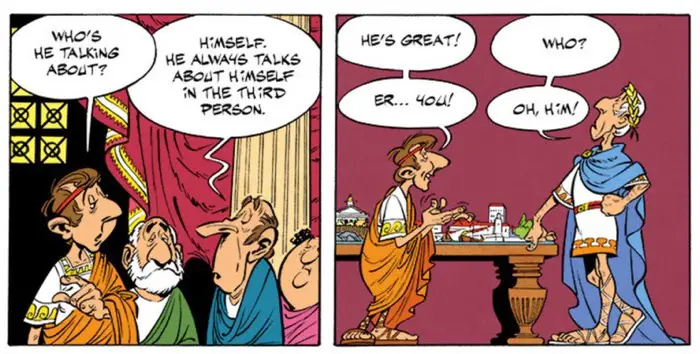
Latin is a pretty weird language. Caesar is speaking it weirdly. Almost all of the places and all of the characters are lost to history with no other attestation. Because of these complications, I could hardly ever figure out what was really going on. I would constantly be looking in Wikipedia to try to figure out stuff like, who was Cassivellaunus? Or what are the Romans doing in Vienna? (There is/was a different one in France.) And basically every time the entire topic would spring into historical existence directly sourced from the pages of Caesar's writings. Often, not a single other thing more was known.
Whatever opinion we may have about Caesar today and whatever we think of the factual veracity of the writing it is clear that the author is an impressively advanced strategist. A very weak one would not have survived so many engagements no matter how the danger might have been exaggerated. And a poor strategist would not think to be exaggerating the seriousness of the engagements like you find in this book. The very fact that none of Caesar's rivals in Roman politics thought to have books written — or at least books that were widely read and copied by historians for thousands of years — speaks for itself.
While I think that Caesar exaggerated his competence as much as possible, I think we can also assume that there is some anchor of truth to what he writes. If he says the troops marched thirty thousand paces ("triginta millia passum" - the origin of our antique measuring unit "mile"), well he probably marched at least most of that because he'd have had several legions of perhaps twenty thousand men who would need to pretty much agree with the account. And many of those presumably would have been tasked with the actual counting. This is why I tend to take Caesar as a pretty reasonable approximation of Caesar's understanding of the true situation, inflated for self-aggrandizement wherever he could sneak it in.
It must be understood, however, that Caesar was a brilliant propagandist. He knew how to impress powerful patricians and plebs alike. He impressed the Senate so much that they eventually felt it best to fill him with enough puncture wounds to deflate his ego a bit.
I'm a little bit impressed with Caesar. No doubt he was a stand out figure in history. But really he deserves to go in the Napoleon and Hitler bin of insanely ambitious, pretty competent, well positioned guys who thought it would be sensible to go rampaging all over Europe. Like those other guys he also wasn't too bogged down with a modern moral compass; while murdering civilians was technically frowned upon in Roman culture, the general societal norms of the time allowed him to be pretty callous about the wholesale slaughter of innocent bystanders when it could be justified as possibly benefiting the Roman people.
But for me this book highlighted something really impressive. What I'm most impressed with is everything else. The world the Romans were not in. We know about the Romans, but isn't it surprising that they found elaborate trading networks and nations and empires very much like theirs? Only we don't know much about those because the only brush they had with literacy was Caesar himself mentioning them in passing. Caesar's writing was like a flashlight shining on a mysterious world of darkness. Like when a bathyscaphe dives into the deep ocean and strange creatures are seen swimming by the viewing port, the parochial perspective is to focus on the marvelous creature before you; the correct perspective is to appreciate in the abstract the alien life you're not seeing that must be out there.
From Caesar, we can see that the Europeans beyond Roman contact were quite a bit like the Romans. They had agriculture, armies, fortified cities, coin mints, mines, artwork, shipyards, cattle, ... pretty much everything that anyone had before gunpowder and steam engines. When it came to boats, horses, and trousers, the Romans were actually somewhat backward in their technology.
Caesar mentions how, with the exception of nobles and druids, the people of Gaul were basically slaves. He almost seems to have pity on the populace for not enjoying Roman style slavery (generally considered "only" around a third of the population). I can never think about historical slavery without comparing it to modern class conflict. I would not want to be a Roman slave or a Gallic serf but there are plenty of uncomfortable parallels in how society is structured today, no matter what we call it.
Throughout the book I kept thinking that it was only by the slimmest of margins that the Romans were rampaging through France and not the other way around. Had some key battles gone the other way, Roman dominance could have been Roman submission. And in that counterfactual, Roman style literacy — inspired by the Greeks and Etruscans — would have been delayed. But I learned that the Greeks did not just colonize and spread their culture and literacy to Italy. They also colonized Gaul. The French city of Marseille was the Greek colony of Massalia when the Romans arrived. This is why coins from Gaul (one of the few other bits of information we have about their civilization) have a Greek alphabet. Here's a French coin with "Marseille" labeled in Greek.
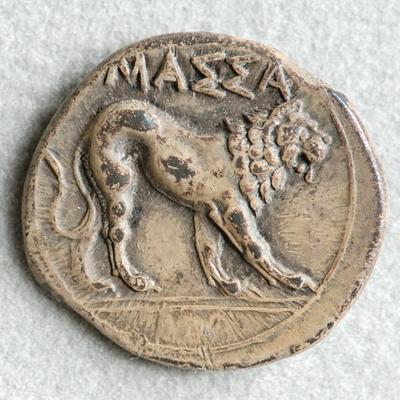
Except for a few lucky breaks — which includes the competence of Caesar — Europeans might all be speaking Gallic derived languages and writing with a Greek alphabet; the religious tendencies would lean more toward Stonehenge, forest spirits, and the weekdays (Tyr, Wodin, Thor, Frigg), and less toward desert preacher mystics from the Roman province of Judea.
Star Trek is popular. Imagine if Captain Kirk (middle name "Tiberius" after the river in Rome and the stepson of the grandnephew of Julius Caesar) wrote a "captain's log" filled with his adventures traveling to "the final frontier". His "five-year mission: to explore strange new worlds; to seek out new life and new civilizations; to boldly go where no man has gone before!" Well, that could be pretty popular. But instead of implausible fictional encounters, imagine if it were ostensibly non-fiction. That's what Caesar's commentaries are. The adventures Caesar writes about take us to the original frontier between prehistory and history, the beginning of what we know about the world in the way we know it. Sure it can be a bit muddled, but if that's not interesting, what is?
A nice thing about ancient literature is that it's often readily available to all. Here are the Commentaries in English with Latin as an option.